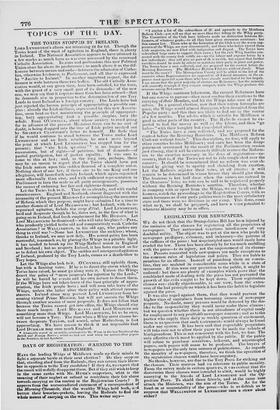LEGISLATING FOR NEWSPAPERS.
WE do not think that the Stamp-duties Bill has been injured by the omission of the clauses for registering all the proprietors of newspapers. They authorized vexatious interference of very doubtful utility. The object was to get at the men who profit by newspaper profligacy, calumny, and indecency—the patrons of the ruffians of the press : but unprincipled men would easily have evaded the law. There has been already by far too much meddling with the press—to its injury, not the improvement of its charac- ter. Persons connected with newspapers are made exceptions to the common rules of legislation and police. They are liable to penalties for no offence. Instead of punishing them on convic- tion, they are mulcted in considerable sums while in a state of innocence. If this were any protection to the public, it might be endured: but there are plenty of examples which prove that the established mode of dealing with the press has not prevented the growth of the evils sought to be kept down. These registration clauses were chiefly objectionable, in our view, from the exten- sion of the bad principle on which it has been the habit to legislate against the press.
It was also urged against them, that they would prevent the higher class of capitalists from becoming owners of newspaper property. No doubt, many persons would lie deterred by the dis- like to the responsibility they would incur under these clauses: but we question whether there is not abundance of capital ready for employment in any profitable newspaper concern; and as to the parties who supply their daily or weekly quantum of excitement, there is no question that such instruments would always be found under any system. It has been said that respectable proprietors will take care not to allow their paper to be made the vehicle of blackguardistn. This is not consistent with the fact, we fear. The only effective cheek must ha applied by the public. If the public will refuse to purchase scurrilous, indecent, and unprincipled papers, such papers will cease to be produced. The buyers of newspapers are the only true censors of publications. As regards the morality of tmwspapers, therefore, we think the operation of the registration clauses would have been nugatory.
No thanks, however, are due to the Tory Peers for striking out the clauses. Their motives had uo reference to public morality. Front the outcry made in certain quarters, it was evident that the discoveries those clauses were Wended to elicit, would be highly annoying to the Needs of Lord LYNDHURST and the Op- position Peers. To shield those friends, and at the same time attack the Ministers, was the aim of the Tories. As for the freedem or respectability of the press—who is se doltish as to suppose that WELLINGTON or LYNDHURST care a straw about either?


























 Previous page
Previous page